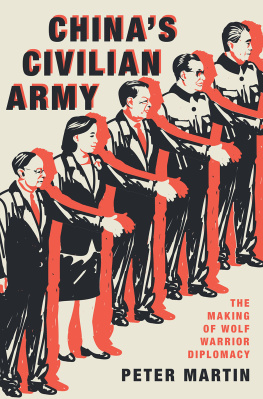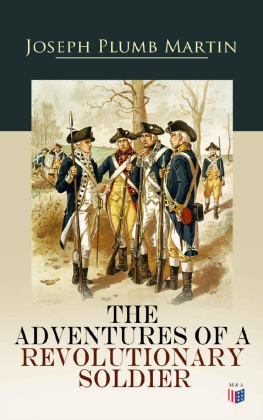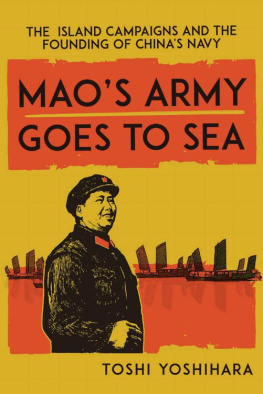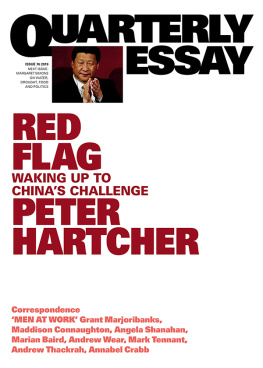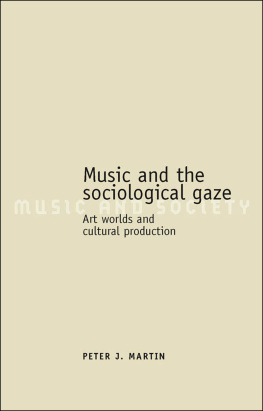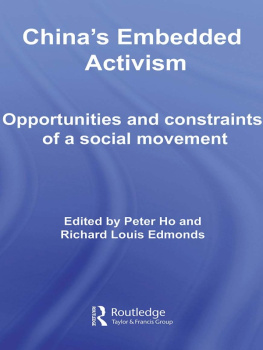Peter Martin - Chinas Civilian Army
Here you can read online Peter Martin - Chinas Civilian Army full text of the book (entire story) in english for free. Download pdf and epub, get meaning, cover and reviews about this ebook. year: 2021, genre: Politics. Description of the work, (preface) as well as reviews are available. Best literature library LitArk.com created for fans of good reading and offers a wide selection of genres:
Romance novel
Science fiction
Adventure
Detective
Science
History
Home and family
Prose
Art
Politics
Computer
Non-fiction
Religion
Business
Children
Humor
Choose a favorite category and find really read worthwhile books. Enjoy immersion in the world of imagination, feel the emotions of the characters or learn something new for yourself, make an fascinating discovery.
- Book:Chinas Civilian Army
- Author:
- Genre:
- Year:2021
- Rating:5 / 5
- Favourites:Add to favourites
- Your mark:
- 100
- 1
- 2
- 3
- 4
- 5
Chinas Civilian Army: summary, description and annotation
We offer to read an annotation, description, summary or preface (depends on what the author of the book "Chinas Civilian Army" wrote himself). If you haven't found the necessary information about the book — write in the comments, we will try to find it.
Chinas Civilian Army — read online for free the complete book (whole text) full work
Below is the text of the book, divided by pages. System saving the place of the last page read, allows you to conveniently read the book "Chinas Civilian Army" online for free, without having to search again every time where you left off. Put a bookmark, and you can go to the page where you finished reading at any time.
Font size:
Interval:
Bookmark:


Oxford University Press is a department of the University of Oxford. It furthers the Universitys objective of excellence in research, scholarship, and education by publishing worldwide. Oxford is a registered trade mark of Oxford University Press in the UK and certain other countries.
Published in the United States of America by Oxford University Press
198 Madison Avenue, New York, NY 10016, United States of America.
Oxford University Press 2021
All rights reserved. No part of this publication may be reproduced, stored in a retrieval system, or transmitted, in any form or by any means, without the prior permission in writing of Oxford University Press, or as expressly permitted by law, by license, or under terms agreed with the appropriate reproduction rights organization. Inquiries concerning reproduction outside the scope of the above should be sent to the Rights Department, Oxford University Press, at the address above.
You must not circulate this work in any other form and you must impose this same condition on any acquirer.
Library of Congress Cataloging-in-Publication Data
Names: Martin, Peter (Reporter), author.
Title: Chinas civilian army : the making of wolf warrior diplomacy / Peter Martin.
Description: New York, NY : Oxford University Press, [2021] |
Includes bibliographical references.
Identifiers: LCCN 2021004587 (print) | LCCN 2021004588 (ebook) |
ISBN 9780197513705 (hardback) | ISBN 9780197513729 (epub) | ISBN 9780197513736
Subjects: LCSH: Diplomatic and consular service, ChineseHistory. |
ChinaForeign relations administrationHistory. | ChinaForeign relations1949
Classification: LCC JZ1734 .M38 2021 (print) |
LCC JZ1734 (ebook) | DDC 327.51dc23
LC record available at https://lccn.loc.gov/2021004587
LC ebook record available at https://lccn.loc.gov/2021004588
DOI: 10.1093/oso/9780197513705.001.0001
Of the many ways that attempting to write a book has humbled me, two stand out. One is learning just how much help I needed. The other is how lucky I am to be surrounded by people willing to provide it.
Jim McGregor took a chance on me a decade ago and has been a friend and mentor ever since. Just slop it out proved to be the sagest of all the advice I received during the drafting process (any remaining slop is my responsibility alone). My dear friend David Cohen deserves a running footnote throughout this book and everything else I write.
I likely would not have begun this project without the early encouragement of Charles Edel over dinner at Founding Farmers in DC. I would certainly never have seen it through without the unstoppable insight and enthusiasm of Jude Blanchette. Ken Wills, Lucy Hornby, Ting Shi, James Green, Steven Lee Myers, Nerys Avery, and Tom Pomeroy all struggled through early drafts, which must at times have been painful to read. They all offered invaluable advice and encouragement.
The book also benefited tremendously from the input of the following people whose expertise and experience improved the manuscripts style and substance: Chris Anstey, Alec Ash, Antony Best, Matt Campbell, Andrew Chubb, Alan Crawford, Rush Doshi, Alex Farrow, Carla Freeman, Chas Freeman Jr., Karl Gerth, Clara Gillispie, Andy Heath, Tim Heath, Ken Jarrett, Jeremiah Jenne, Betsy Joles, Dan Ten Kate, Jeff Kearns, Wes Kosova, James Mayger, Trey McArver, Richard McGregor, Jessica Meyers, Will Millard, Colum Murphy, Lance Noble, Junni Ogborne, Lena Schipper, Brendan Scott, Charlie Seath, Gerry Shih, Katie Stallard-Blanchette, David Wainer, Bob Wang, Dennis Wilder, and Keith Zhai.
I owe an immense vote of thanks to the many dozens of people who spoke to me during the course of this project who are either named in the footnotes or chose to remain anonymous. I would also like to thank Wang Wei, my wonderful Chinese teacher of many years who tolerates my strange desire to master Party-speak.
I am grateful to the Bloomberg Politics team for being supportive of this project, especially Brendan Scott, Dan Ten Kate, Ros Mathieson, and Wes Kosova. Kristin Powers and Samantha Boyd have also been generous with their time and provided useful advice. All of the opinions in the book, though, are mine alone. Thank you also to David McBride and Holly Mitchell at Oxford University Press for commissioning this project and patiently helping me see it through to the end.
I would like to thank my partner, Alexandra, for being my best friend and constant inspiration, and my brother, Graham, for being a rock. Finally, I would like to thank my parents to whom I owe more than they will ever know. This book is dedicated to them.
It was late afternoon when Rimbink Pato, Papua New Guineas foreign minister, heard a loud commotion outside his door. Seconds later, four Chinese diplomats burst uninvited into his office, demanding last-minute changes to the communiqu of the 2018 Asia-Pacific Economic Cooperation summit, the Pacifics most important economic and political forum.
For Papua New Guinea to have even hosted a meeting of APEC, whose members represent around 60 percent of the worlds GDP, was a feat in itself. The sprawling archipelagic nation in the middle of the South Pacific has a population of just 8.6 million people and is among the poorest on earth. With 850 languages and more than 600 islands, it was difficult to govern at the best of times. The capital Port Moresby had a reputation for violence, prompting the countrys southern neighbor and former colonial overlord Australia to provide security for the event by stationing a warship in the harbor.
China had been meticulously building its influence in the resource-rich nation for years, ramping up investment and building infrastructure. Chinese loans had funded hospitals, schools, and hydropower stations across the country. By the time the summit took place in November 2018, the nation owed a quarter of its external debt to Beijing.
It looked like the event would be an easy win for Xi Jinping, the president of China and head of the ruling Communist Party. President Donald Trump skipped the meeting, sending Mike Pence, the vice president, instead. Pence spent little time on the ground, instead stationing himself in nearby Cairns inland from Australias Great Barrier Reef because of concerns about violence.
Xi was the first foreign leader to land in Port Moresby. Ahead of his arrival, local newspapers carried an op-ed in his name, which hailed the rapid growth in ties as the epitome of Chinas overall relations with Pacific island countries.
At the summit, Xi delivered his standard speech on the importance of open markets and globalization. Hed used public appearances since Trumps surprise election victory in November 2016 to contrast Chinas approach to the America first protectionism espoused by his American counterpart, and APEC was no exception. The audience of global executives and political elites applauded when he told them, without naming names, that implementing tariffs and breaking up supply chains was short-sighted and doomed to failure.
This public display was largely under Chinas control. The ongoing behind-the-scenes wrangling over the summits communiqu, however, was not. In a last-minute push to influence wording about unfair trade practices that they believed targeted Beijing, Chinese diplomats took matters into their own hands by requesting a sit-down with Papua New Guineas foreign minister. He refused, arguing that bilateral negotiations with an individual delegation might jeopardize the countrys neutrality as host. The Chinese tried again but were once more rebuffed.
Font size:
Interval:
Bookmark:
Similar books «Chinas Civilian Army»
Look at similar books to Chinas Civilian Army. We have selected literature similar in name and meaning in the hope of providing readers with more options to find new, interesting, not yet read works.
Discussion, reviews of the book Chinas Civilian Army and just readers' own opinions. Leave your comments, write what you think about the work, its meaning or the main characters. Specify what exactly you liked and what you didn't like, and why you think so.

